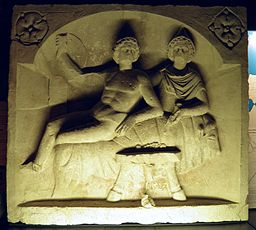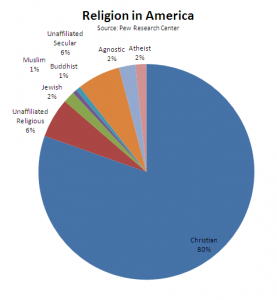The War on Christmas 2017

I started hearing about a “war on Christmas” about 10 years ago. This news that Christmas was under siege reached me 30 years into my career as a Presbyterian minister. Over these decades, I’ve developed a fine-tuned antenna for any threats to Christian faith. An important part of a pastor’s calling is responsibility for my congregant’s spiritual well-being. I never thought that Christmas was at risk. In fact, what I thought was that Christmas was most vibrant part of Christian faith. December was my easy month for attendance. I never remember a Christmas Eve Service that failed to stress out the ushers, who had to jam overflow Christmas revelers into pews and folding chairs.I have come to see Christmas as Christianity’s most effective public relations strategy. The story about Jesus’ Nativity is a masterwork of subtlety and beauty. Biblical scholars call the Christmas story the “gospel in miniature.” People who had never heard the Sermon on the Mount will nevertheless know the story of Mary and Joseph and their baby in the manger. In December, I’ll be shopping in Walmart and hear, “Hark the Herald Angels Sing” over the loud speaker. This carol’s lyrics are pure incarnation theology: “Hail the Flesh, the Godhead see, Hail the incarnate Deity, pleased as man with men to dwell, Jesus, our Emmanuel…”
Christmas in America
The holiday season sweeps so many people into its enchantment that we as Americans relax the Constitutional principle of separation of Church and State. No one is too worried about the disestablishment of religion as the High School Choir rehearses Christmas Carols for the winter concert. The County Commission wants to schedule a local minister to offer a prayer at its December meeting. In December, it feels as if I have become the whole town’s chaplain. Non-believers need to put up with Christmas.
Christmas’s Earliest Beginnings
I think of Christmas as soft and hushed. I associate the holidays with the fragrance of pine in the makeshift cattle shed, the sweet cry of a newborn, and rustic shepherds gawking at the manger in the middle of the night. Nevertheless, Christmas has a pushy side. The earliest Christians didn’t start getting enthusiastic about the Festival of Jesus’ Nativity until the middle of the Fourth Century A.D. It was Epiphany, the remembrance of Jesus’ manifestation to the world, that the first Christians observed instead of Christmas. Because the gospels don’t give us enough evidence by which to calculate Jesus’ date of birth, the Early Church arbitrarily plunked Christmas down on calendar’s shortest day. Maybe the church leaders were hoping to capitalize on the imagery of increasing sunlight. So, in the middle of the 300’s a.d., Christmas was designated to be celebrated on December 25th .

Worship of the Invincible Sun
Curiously, there was another holiday celebrated on December 25. It originated in Persia, was popular in the Fourth Century with Roman soldiers, and was dedicated to the Sun God, Mithras. The Church had no particular liking of Mithraism, and, in an exquisitely non-politically correct manner, scheduled the Festival of the Nativity on Mithras’ day. The scheme worked and Mithraism, which celebrated the Invincible Sun, was never the same. Christmas, on the other hand, grew in popularity, attracting songs, foods, and decorations from every culture on the face of the Earth.
It doesn’t look to me as if Christmas is beleaguered or has taken much fire from any war against it. From this pastor’s experience, Christmas rumbles through American culture for 6 weeks like a deafening freight train, shaking the whole house.
Left Behind by Christmas
There’s another dimension to Christmas. It shouldn’t surprise us that In the midst of the December hubbub, there are people who object to what has become of Christmas.
Churches complain about consumerism, which appears contrary in spirit to the tender image of Jesus’ birth.
Grieving people feel abandoned when everyone else’s loved ones gather for Christmas togetherness.
And non-Christians (20 percent of Americans) sometimes don’t wish to be overrun by, pay for, or be inconvenienced by Christmas traditions.

Some of the people in this third group are credited with waging the alleged war on Christmas. In other words, some of the non-Christian population in America feel that the Christmas freight train is crashing through the Constitution’s First Amendment principle of separation of Church and State. Lately, they’ve felt emboldened to resist
Ever since self-proclaimed atheist, Madalyn Murray O’Hair’s stunningly successful 1963 lawsuit, which compelled the United States Supreme Court to end public school Bible reading, Christians have felt attacked by atheists.
As a minister, I can report that few circumstances awaken a parishioner’s anxiety like the rumor that someone like Madalyn Murray O’Hare was getting ready to strike. The dreaded lawsuit that threatens to shut down an opening prayer at a football game in Alabama doesn’t make one scintilla of difference in a community’s practice or prayer. However, the court action by ACLU and non-religious types has a terrorist effect on churchgoers who feel that Christianity is in imminent danger of being snuffed out. This fear in the pews is palpable to ministers.
What’s Up with Atheism?
Through most of my four decades in pastoral ministry, atheism has steadily been losing air. Between 1963 and 2007 for example, the phenomenon of the public non-believer practically disappeared. Theologian, Alister McGrath published, The Twilight of Atheism, in which he prematurely proclaimed godlessness as dead. Publication of that book came, ironically on the doorstep of atheism’s latest resurgence. This “new atheism,” is centered around the infamous “Four Horsemen” (Richard Dawkins, Christopher Hitchens, Samuel Harris, and Daniel Dennett). Moreover, this resurgence features a new component, not seen in the past, namely anti-religion assertiveness. In the last few years non-Christians are more willing to raise a protest over infringement of their religious rights, in this case, their right to be irreligious.
It’s important to understand that even at its high ebb, atheism poses no risk to Christianity or Christmas. At the zenith of New Atheism, I had a pleasant lunch with the organizer of the humanist/non-religion group in the small southern community where I was a pastor. Two eye-opening insights came out of that conversation: First, not many people are willing to become part of an organized, non-believing group. I remember musing that there were seven adult Sunday school classes in my church, each of which had more members and more vitality than the community-wide anti-religion club. Second, the new atheists were beset with the old problem of flagging interest, poor attendance, and an inability to recruit adults younger than 50.
The Culture Wars
Here’s where I’m going with this: The War on Christmas and any wider conspiracy to snuff out Christianity is bogus. I’m not the first to say this. You can read excellent articles about the War on Christmas here and here .
Nevertheless, politicians continue to talk about and stoke the dread of losing Christianity. Bill O’Reilly, when he was still on Fox News, placed the Christmas war in the context of a wider progressive assault on traditional values.
Consider this 2004 warning, which insidiously stokes the very churchgoer anxieties with I’ve described:
All over the country, Christmas is taking flak. In Denver this past weekend, no religious floats were permitted in the holiday parade there. In New York City, Mayor Bloomberg unveiled the holiday tree and no Christian Christmas symbols are allowed in the public schools. Federated Department Stores, [that’s] Macy’s, have done away with the Christmas greeting, “Merry Christmas.”
Now, all of this anti-Christian stuff is absurd, and may even be a bias situation. But the real reason it’s happening has little to do with Christmas and everything to do with organized religion.
Secular progressives realize that America as it is now will never approve of gay marriage, partial birth abortion, euthanasia, legalized drugs, income redistribution through taxation, and many other progressive visions because of religious opposition.
But if the secularists can destroy religion in the public arena, the brave new progressive world is a possibility.
Sara Palin has written a book, Good Tidings and Great Joy: Protecting the Heart of Christmas on the purported anti-Christmas conspiracy. Preeminently, Donald Trump, as if opening the gates to the death camps, has proclaimed again this year, “We’re going to have Christmas again.” Unbelievably, Trump’s supporters greet this line with roars of approval.
Fortress Christianity
As I’ve discussed in a previous posts, I scratch my head over the political right’s captivity of the Evangelical Church. Evangelicalism is, at its heart, a renewal movement founded on a handful of principles:
The literal reading of the Bible,
The need to be converted,
Holiness of life,
A robust doctrine of human sinfulness,
And the centrality of grace that comes through the atoning sacrifice of Jesus Christ.
How these values square with allegiance with the political right wing in America is murky to me. My speculation is that evangelicals, feeling beset by advancing secularism and the up ending of traditional values, are willing to cling to any champion who promises to protect them. Their preachers can’t tell them that they’ll do battle in the War against Christmas. But politicians can.
I’ve labeled the phenomenon of clinging to any champion who will protect the faith as, “fortress Christianity.” I know firsthand church members’ fear of atheism and their willingness to put aside other Christian principles when they feel that an enemy is poised to crash through the church’s front door and turn over the communion table. And that’s what they’re hearing from one quarter in the political world—the quarter that would lead them into a battle that the Babe in the manger has no need for them to fight.

2 Replies to “The War on Christmas 2017”
Thanks again, Ed, for your thoughtful comment. I’m hoping that I’ll hear from you here frequently. Merry Christmas.
Good analysis. I also agree that Christmas is here to stay. However, “Christmas” is celebrated large in places like Japan, which would hardly be considered a Christian nation. It does kind of bug me that Rudolph is as popular as Jesus on the radio, but that’s not a bad thing. Some secularism is fine. I doubt that the biblical Christmas story is as warm and fuzzy as we envision it, either, but what’s wrong with a little embellishment for the faithful. I was reading a book entitled “Zealot” which zapped just about every belief I carried about the life of Christ. Not only did the infant never go to Egypt in exile, but Joseph (and Jesus) were not carpenters (nothing made of wood in Galilee), and no way a young Jew back then would ever not be married. I have problems with the war between the true literalists and those scholars who debunk everything we ever knew. Maybe people like us can infuse some rationality to Christianity. Happy Advent.